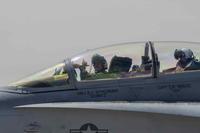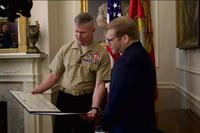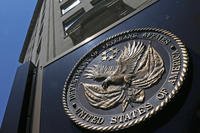President Barack Obama's push for closer military ties with Vietnam could lead to joint ground training exercises between the two nations, both in Vietnam and in the U.S., a top Army commander said Wednesday.
Army Lt. Gen. Stephen Lanza said Americans training with Vietnamese was "predicated on what our senior leaders want to do," but added, "I think our forces both operationally and tactically are ready to train with anybody that has an opportunity to train with U.S. forces."
Lanza, commander of the Army's I Corps and Joint Base Lewis-McChord, and Maj. Gen. Charles Flynn, commander of the 25th Infantry Division, spoke to reporters in a phone interview from Hawaii, where they were engaged in the Land Forces Pacific, or LANPAC, Symposium sponsored by the Association of the United States Army.
Both Lanza and Flynn outlined the expansion underway for the "Pacific Pathways" initiative of U.S. Army Pacific, or USARPAC, which has sent units to the region to train with the armies of partner nations.
Under what they called a "reverse Pacific Pathways" program, Lanza and Flynn said troops from Singapore, Japan and Canada will come to the U.S. from July through September to train with U.S. forces in Hawaii, Washington state and Alaska.
When asked if there were a similar role for Vietnam in the future, Lanza gave a cautious response.
"I'm not speaking for the Army, let's be clear," he said. "We are prepared to train based on the requirements we've been given with the countries that have asked to train with the U.S military. So if the opportunity avails itself, we will participate based on the task and the mission we've been given."
The possibility for joint training with Vietnam was in line with Obama's efforts this week on his trip to Hanoi and Ho Chi Minh City (Saigon) to boost military cooperation with the former enemy state as part of the rebalance of U.S. forces to the Asia-Pacific and as part of regional moves to counter China's aggressive actions in the South China Sea.
At a news conference in Hanoi Monday, Obama said, "One of the things that has happened through this comprehensive partnership is a dialogue between the U.S. and Vietnamese military that we hadn't seen in a very long time.
"And we already have U.S. vessels that have come here to port," he said. "We expect that there will be deepening cooperation between our militaries, often times around, 'How do we respond to humanitarian disasters in this region?'"
The U.S. and Vietnam restored diplomatic relations in 1995, and military-to-military ties were renewed in 2011 with a memorandum of understanding on maritime security; search-and-rescue operations, disaster relief and peacekeeping.
To counter China, Obama also announced that he was lifting the 50-year embargo on selling arms to Vietnam, which has become increasingly involved in territorial disputes with China over the South China Sea.
"Big nations should not bully smaller ones," he said.
Vietnam is reportedly interested in buying F-16 fighter jets and P-3 Orion maritime surveillance aircraft, unmanned aerial vehicles, or UAVs, and other American-made military equipment.
Speaking to reporters earlier this week, Defense Secretary Ashton Carter said lifting the ban on arms sales was not aimed at China but "there's no question that China's actions there, particularly those over the past year, have heightened concern in the region, and that's another factor that causes everyone to want to work with us."
Deepening U.S.-Vietnamese military cooperation is part of a larger trend under Obama of improving bilateral relations with Pacific Rim countries, Carter said.
Pacific Pathways begun under Gen. Vincent Brooks, the former USARPAC commander and now commander of U.S. Forces-Korea, was envisioned as a program to get the Army more involved on the Pacific Rim, traditionally the bailiwick of the Navy and the Marine Corps.
Flynn said that the "reverse Pacific Pathways" initiative was a "natural evolution" for the program.
"While going into the region and understanding the region" was important for Army units, "it's equally as important for the forces in the region that we're training with to come to our environment, to our training facilities," Flynn said.









